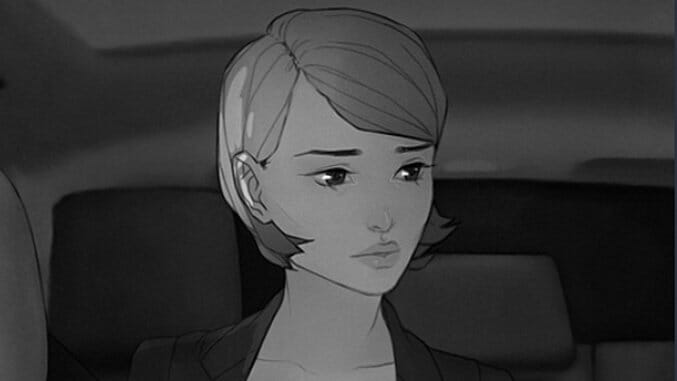
By absolutely immolating himself in the autobiographical Actual Sunlight, writer and director Will O’Neill has more than earned the right to abrade his surrounding culture. Quite literally given its climactic scene, in his debut, O’Neill destroyed his own image, along with any pretences of façade or dissimulation: if a writer is so propelled by the search for truth that he’s willing to unveil himself as a languid, chronic masturbator, he can be trusted, to call with authority the shots on the world around him.
But Little Red Lie, O’Neill’s acerbic and occasionally brilliant second game, can also feel written-to-order. Its castigations of social and generational divisions, the internet, Canadian politics and even family, are undoubtedly sincere, but familiar, too. O’Neill certainly writes terrific dialogue. With a ribald, kind of Mametian nonsense-poetry, he regularly hits upon whatever you’d call the opposite of bullshit, and develops characters who often have the sole redeeming feature of being able to justify back to us our most shameful convictions. He also has heart. In one scene in Little Red Lie, O’Neill provides a gruff, 23-word description of being in love that is one of the most beautiful things I’ve read—forget good writing for a videogame; this script is usually brilliant by any standard. But it can also be very and adolescently nihilistic.
One plot twist in particular insists that essentially everything we do as people, even on the most intimate scale, is predicated on venality and self-interest. The game’s central conceit, that the only way to survive these days is to lie rather than satirise the political and financial climate, simply embodies it: compared to Actual Sunlight, O’Neill seems less interested in edifying his audience than just reminding them they’re doomed. When Little Red Lie eventually spirals into self-effacement, and unnecessarily divulges that even and especially videogames are untruthful, I wonder why I’m bothering to play.
Compared to basically every other game-maker, who assumes a kind of faux compassion, and assures me fiction should relax and put my mind to rest, I admire O’Neill for being provocative and trying to keep me awake at night. But too often Little Red Lie disgorges the kind of blanket cynicism and absolute faithlessness that I, and I imagine a lot of other people, grew out of in their 20s. Perhaps I’ve been sheltered from the absolute misery it depicts, but when its sentiments (though refreshingly uncompromising)are also so recognisable, it’s hard to feel that I’m being alerted.
On the contrary, where it doesn’t always elucidate on its biggest and encompassing themes, Little Red Lie fastidiously breaks down its characters: with certain and coarse language, O’Neill articulates nuances of behavior that to other writers might seem ineffable. Arthur Fox, the game’s monied and flatulent anti-villain, is agonisingly aware that his success is both totally undeserved and completely inevitable. Compared to his counterpart, the borderline-destitute Sarah Stone (who, owing to her ill family, evaporated savings and a closed job market, just cannot get it together), he is powerless against his own nature. In a display of bittersweet understanding, O’Neill depicts both characters as sort of victims: Stone of circumstance, Fox of his own, intransigent compulsions. But at the same time, neither protagonist is let off of the hook. For all his vulnerabilities, Fox is still a licentious, self-preserving capitalist, who values other people based only on what they can provide for him, a way of thinking brought nauseatingly to bear during one scene in a hotel elevator. Stone has been put through the ringer and deserves a lot more than gets, but consistently allows neuroses and past experience to get the better of her. When her unhealthily low estimations of both herself and of other people are later proven well-founded, Little Red Lie is at its most tragic, but also its most disappointing.
O’Neill basically states that misanthropy is right and objective, and in the process sacrifices the ambiguity in Stone that he otherwise so expertly crafts. He clearly values or even adores his characters, because he dedicates so much of his game to illuminating their complexities—to see one of them thrown so ruthlessly beneath the wheels, just to make a questionable point about how everything, really, is a lie, feels like a shame. By that measure, Little Red Lie has something in common with the popular TV show The Walking Dead, which seems labored under the conception that sorrow and bleakness correlate to reality: the more abjectly unhappy the whole thing becomes, the closer it will draw to some great revelation about the experience of being alive. Perhaps there’s some truth in this kind of writing, but it ignores that enjoyment, intimacy and shared pleasures can also be sobering. Emotional and intellectual maturity needn’t always be products of despair, and contentment doesn’t equal blithe acceptance.
But Little Red Lie is angry, purposefully, verbosely, unsympathetically angry, and the last time I felt like I could say that about any videogame, and mean it, was when I reviewed Actual Sunlight. Games in particular promise to coddle and keep us safe. For thirty-plus hours, they’ll instantiate a comforting pattern of effort rewarded with success. O’Neill provides the opposite. His writing is discomforting, confrontational and an acquired taste. He’s confident in his assertions and motivated by the knowledge that not everybody will like them. The lack of caution occasionally leaves Little Red Lie feeling more like a rant than a cohesive drama, but also fuels the game’s many, caustic insights. Will O’Neill is the rare example of a modern game-maker with something to say. And although not every word of it is trenchant, or even entertaining, it’s all worth listening to.
Little Red Lie was developed by Will O’Neill and is available through Steam.
Ed Smith is a writer from the UK. You can follow him on Twitter @mostsincerelyed and find more of his work at bulletpointsmonthly.com.
